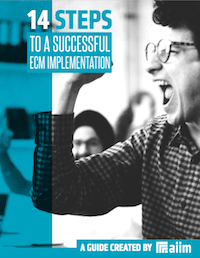The AIIM Blog
Keep your finger on the pulse of Intelligent Information Management with industry news, trends, and best practices.
Change is hard, but not impossible. Understanding how change works, considering how people will react to change, and planning a thoughtful roll-out are all ways to ease the burden of change. It’s a practice called Change Management, and for organizational change, it can be your key to success. It’s also important to recognize that not every change situation can be managed in the same way. An important first step in enacting change is to understand which type of change your change management project falls under. In organizations, change can be grouped into two broad categories – transformational and transitional.
Share
How Do I Know I Need Change Management? The funny thing about Change Management is that it’s one of those things that you probably don’t know exists until you need it. Yes, I know that’s an odd thing to say, but hear me out on this. With change management, here’s a very common scenario leading to awareness.
Share

Making an ECM implementation successful requires planning and attention to detail. The best way to create the right solution is to identify organizational goals and priorities. Learn how to manage a successful implementation in our free guide.
Intelligent Information Management (IIM)
Here at AIIM, we believe that information is a business asset. Your information has the potential to help you digitally transform and understand, anticipate, and redefine experiences for your customers. But, information is a different type of asset. An asset like money is much more straight-forward because it’s easy to see its value and easy to understand. Your information is much different in that it needs attention in order to become an asset.
Share
Automation | Electronic Records Management (ERM) | Information Governance
When the dominant terminologies to describe a problem change, there is often a corresponding confusion in the roles that individuals play. In the broader content space, we experienced some of this disorientation as the core language used shifted from “ECM” to “Content Services,” and then with the incorporation of “Content Services” into the broader framework of “Intelligent Information Management.” This same terminology disorientation has been true in the governance arena as well, with varying uses and interpretations of “Records Management” and “Information Governance.” The confusion has left some organizations asking, “Do we need Records Managers, or do we need Information Governance professionals?”
Share
Automation | Electronic Records Management (ERM) | Information Governance
Before we start, let’s take a minute to address the big elephant in the room. You’re probably thinking, “Where are you going with this sales angle, Sean? I work with records and information, and my job is all about managing, protecting, and storing it. I don’t sell a thing!” Well, what we’re going to cover today will show you that you ARE, in fact, in the business of selling when it comes to Information Governance – it’s just a slightly different model than we’re all used to. In this selling model, we’re not exchanging goods and services for money; we’re exchanging ideas for acceptance.
Share
Automation | Electronic Records Management (ERM) | Information Governance
Words are important. Beyond that, the words you choose can mean the difference between someone understanding what you’re saying and someone giving you that glazed expression with one eyebrow lifted saying, “Huh?” It’s just as important to think of WHO you are communicating to, as it is to think of WHAT you’re trying to say. Allow me to share a quick example to illustrate my point. One of my favorite hobbies is fly fishing. To me, there’s nothing like being out in the middle of nowhere, wading into the middle of a crystal clear river, and trying to fool some trout.
Share